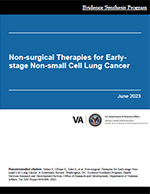
|
Recommended citation: |
Download PDF: Complete Report, Executive Summary, Report, Appendices
Lung cancer is the leading cause of cancer mortality. Surgery is considered standard care for many individuals with early-stage lung cancer. However, evidence is very uncertain on the effectiveness and harms of surgery versus stereotactic body radiation therapy (SBRT) or stereotactic ablative radiotherapy (SABR) for stage I lung cancer. Information on other ablative techniques is limited in quantity and quality, coming from retrospective, non-randomized studies. RCTs are needed to assess the effectiveness of SABR/SBRT vs. surgery for patients with medically operable stage I lung cancer.
We conducted a systematic review of randomized trials to examine the comparative effectiveness of SABR/SBRT vs. surgery. Additionally, we constructed an evidence map describing the characteristics and outcomes of studies evaluating SABR/SBRT, surgery, thermal ablation techniques (e.g., microwave, radiofrequency and laser ablation and cryoablation) and brachytherapy.
Two publications addressed SABR/SBRT vs. surgery. One reported pooled outcomes of the STARS and ROSEL trials. Both were small and ended early due to poor enrollment. Another publication reported quality of life data from the ROSEL trial. As such, the evidence for survival, adverse events, and quality of life is very uncertain. No articles reported on whether benefits and harms of SABR/SBRT vs. surgery varied by patient and intervention characteristics. For the evidence map, no RCTs examined ablation therapies for stage I lung cancer. Six studies reported on ablation vs SBRT/SABR, ten studies reported on ablation vs surgery, two compared SBRT/SABR vs radiofrequency ablation vs surgery. Radiofrequency ablation was most commonly studied (k=11). Most studies had <300 participants (k=12), except for 6 large administrative datasets, and were conducted in the US (k=9), Europe (k=3) or China (k=3). Studies reported on overall survival (k=18), disease-free survival (k=8), local/regional recurrence (k=12), any adverse events (k=11). Most were conducted prior to widespread lung cancer screening.
Non-Surgical Therapies for Early-stage Non-small Cell Lung Cancer: A Systematic Review (Management Brief)